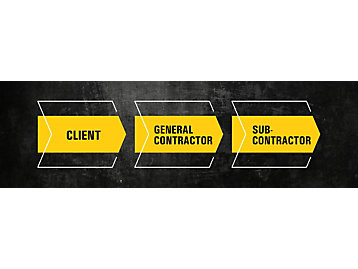

Sign In
Welcome! Sign In to personalize your Cat.com experience
If you already have an existing account with another Cat App, you can use the same account to sign in here
Register Now
One Account. All of Cat.
Your Caterpillar account is the single account you use to log in to select services and applications we offer. Shop for parts and machines online, manage your fleet, go mobile, and more.
Account Information
Site Settings
Security
Author: Small Business Expert | February 29, 2024 | Topic: Used Equipment

General contractors and subcontractors are integral in construction projects. They each have unique roles and provide a niche skill set. How do you decide between a general contractor or subcontractors for your job? Is there a difference between them?
While these roles can sound similar, they have numerous differences. When you understand the differences and similarities between contractor roles, you can make an informed decision when hiring personnel for your project.
What Is a General Contractor?
A general contractor is a person or business a client hires to oversee a construction project. A general contractor signs a contract covering the terms of their service to their client. They directly report to the client while still working for themselves. For example, a contract owner can decide on a project completion time but likely can't control how a contractor performs the job, their tools and the people working under them.
General contractors can hire laborers and subcontractors who, by contract, will report to them. General contractors can manage and perform construction work. They can market their business, select clients and set their payment rates. A general contractor in construction is known solely as a contractor and person responsible for managing an entire job and working with a client from start to finish.
A contractor's work in construction can include:
- Managing project details
- Overseeing project budgets
- Managing project timelines
- Delegating tasks
- Hiring subcontractors and other skilled laborers
- Buying and supplying materials for projects
- Ensuring work qualify and standards
- Ensuring employees comply with safe work procedures
What Is a Subcontractor?
A subcontractor is a skilled tradesperson hired by a general contractor. They do specialized and hands-on jobs like plumbing, painting and roofing on a construction site. While a subcontractor can sign a contract with the general contractor, they have autonomy over their working styles, times and hours and are often self-employed. Subcontractors do not sign an agreement with the primary employer and work indirectly with them when there is a general contractor on board.
General contractors communicate with subcontractors and pay them with the money they receive from the client. Subcontractors can hire or sublet tasks to other subcontractors and be responsible for the work quality of those working under them. Some subcontractor skills can include:
- Woodwork
- Plumbing
- Electrical wiring
- Painting
- Drywalling
- Tiling
- Insulation installation
- Plastering
- Laying foundations
- Appliance installation
Differences Between General Contractors and Subcontractors
General contractors and subcontractors are contractors regardless of their roles and hierarchy. While subcontractors and contractors can have many differences, they share numerous similarities. Understanding the differences and similarities between contractors and subcontractors can help you distinguish between each profession.
Here are some of the differences to know between subcontractors and general contractors:
Roles and Responsibilities
General contractors' and subcontractors' roles and responsibilities differ in various ways. A contractor runs a construction operation, finding clients and marketing their business. They are also responsible for the project delivery and quality. A subcontractor focuses on providing a niche skill and offering construction services.
Common general contractor roles and responsibilities can include:
- Liaising with clients
- Finding new business
- Planning budgets
- Marketing and sales
- Delegating tasks
- Monitoring daily site operations
- Managing project cashflow and deadlines
- Overseeing tradespeople's work and paying their wages
Common subcontractor roles and responsibilities can include:
- Following the budget set out by the general contractor
- Adhering to subcontractor terms of agreement
- Communicating with general contractor
- Performing and completing labor tasks by the agreed due date
Relationship With the Client
General contractors work directly with clients, while subcontractors do not have a direct obligation or commitment to the client. If a subcontractor needs information, they'll communicate with the general contractor, who updates the primary employer on construction work progress and other details.

Contracts
A general contractor has a contract with the client. It's their responsibility to meet and fulfill the contract terms. The subcontractor can have an agreement with a general contractor but has no agreement with the primary contract holder. Therefore, the general contractor will likely be liable if something goes wrong on-site. However, a general contractor can hold a subcontractor accountable if they breach a subcontractor agreement.
Salary and Payment Methods
Subcontractors and general contractors can earn different salaries and have varying payment methods. The main employer pays the contractor, who then pays the subcontractor. This pay flow can impact subcontractors, as they only get their wages once a general contractor receives their earnings. A general contractor might also set hourly or monthly rates, while a subcontractor might earn according to an industry average.
Surety Bond
A primary employer can require a surety bond from a general contractor. This bonding protects and covers the client's interests and assets from possible construction site failure. A general contractor's bond often covers sublet work, meaning the subcontractor might not require a separate surety bond.
Similarities Between General Contractors and Subcontractors
While general contractors and subcontractors have different skills, they can have many similarities, including:
Ownership and Supervision
General contractors and subcontractors can work independently. While they must meet agreed project deadlines, general contractors and subcontractors supervise their working hours and methods. They can also decide on the tools, equipment and materials to use in a project and hire suitable laborers without approval from the sole employee.
Insurance
Subcontractors and general contractors are responsible for liability insurance, workers' compensation and other assurances. These insurances are vital for protecting subcontractors and general contractors from facing legal suits in instances of damage or injuries on site.
Licensing and Certifications
While licensing, certificates and education for subcontractors and general contractors can vary, both parties require some form of accreditation. A general contractor must have business registration and licensing and subcontractors require certification in their trade skills.

Visit Your Local Cat® Dealer for Quality Equipment for Your Next Job
Contractors are essential on a construction site. They oversee and manage projects and provide specialized expertise to complete a job. A subcontractor might work on small-scale and specialized tasks, while a general contractor can oversee more extensive project services. Depending on the job scale, contractors need machinery for performing and completing the job.
At Cat® Used, we have a wide selection of high-quality used heavy equipment to meet various project specifications. A Cat dealer can help you source suitable machinery to meet your construction goals and criteria. Find a Cat dealer in your area to learn more about a piece of equipment for your job.



